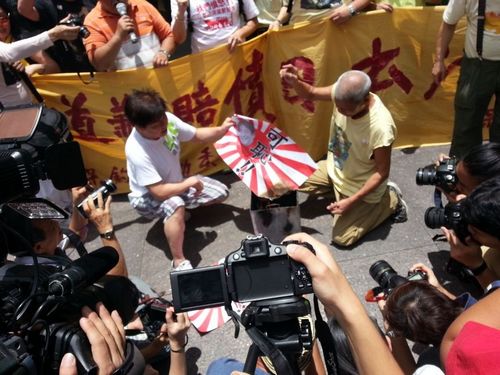There are solid reasons for China to claim ownership of the Diaoyu Islands.
The islands have been under the jurisdiction of China’s navy as islands affiliated with Taiwan since the Ming Dynasty (1368-1644). The Ming and Qing dynasties of China exercised sovereignty over the Diaoyu Islands and their affiliated islands, and officially included them in maps.

A group of Hong Kong residences protest in front of Japanese Consulate in Hong Kong on July 6, 2013.
|
|
Japan has its own claims. It believes that Japan and China signed the Treaty of Shimonoseki in 1895 and as a result, China ceded Japan the island of Taiwan together with all its affiliated islands. Japan put the Diaoyu Islands and the affiliated islands under the jurisdiction of Okinawa Prefecture. This was the origin of backroom deals between Japan and the US regarding the jurisdiction of the Diaoyu Islands thereafter. |
However, the international community has the final say on the ownership of the islands.
On December 1, 1943, China, the US and the UK issued the Cairo Declaration, which stated in explicit terms that the Three Great Allies were fighting this war to “restrain and punish the aggression of Japan” and required that “all the territories Japan has stolen from the Chinese, such as Manchuria, Formosa, and Pescadores” shall be restored to the Chinese side.
According to international law, the Diaoyu Islands and their affiliated islands have belonged to China since then. On July 26, 1945, the eve of the victory of the World Anti-Fascist War, China, the US and the UK issued the Potsdam Proclamation to reaffirm that
“the terms of the Cairo Declaration shall be carried out.”
The Cairo Declaration used “stolen,” a word rarely seen in international legal instruments, and it was reaffirmed by the Potsdam Proclamation. This clearly defines the illegal nature of Japan’s aggression and the stealing of Chinese territory, and makes it clear to the whole world that China is the owner and Japan is the thief.
Some political figures in Japan question the authority and legitimacy of the Cairo Declaration and the Potsdam Proclamation. It is arrogant, if not ignorant, and even hysterical to a certain extent.
|
|
The Cairo Declaration and the Potsdam Proclamation are important outcomes of the victory of the World Anti-Fascist War, which lay the legal foundation for the postwar international order. They are of universally undoubted authority and legitimacy. The Japanese side stirred up tension when “purchasing and nationalizing islands,” and further denied the outcomes of the victory of the World Anti-Fascist War. It constitutes a threat to the peace and stability of the Asia-Pacific region. |
Text of Cairo Declaration, released on Wednesday, December 1, 1943.
President Roosevelt, Generalissimo Chiang Kai-shek and Prime Minister Mr. Churchill, together with their respective military and diplomatic advisers, have completed a conference in North Africa.
The following general statement was issued:
“The several military missions have agreed upon future military operations against Japan. The Three Great Allies expressed their resolve to bring unrelenting pressure against their brutal enemies by sea, land, and air. This pressure is already rising.
“The Three Great Allies are fighting this war to restrain and punish the aggression of Japan. They covet no gain for themselves and have no thought of territorial expansion. It is their purpose that Japan shall be stripped of all the islands in the Pacific which she has seized or occupied since the beginning of the first World War in 1914, and that all the territories Japan has stolen from the Chinese, such as Manchuria, Formosa, and The Pescadores, shall be restored to the Republic of China. Japan will also be expelled from all other territories which she has taken by violence and greed. The aforesaid three great powers, mindful of the enslavement of the people of Korea, are determined that in due course Korea shall become free and independent.
“With these objects in view the three Allies, in harmony with those of the United Nations at war with Japan, will continue to persevere in the serious and prolonged operations necessary to procure the unconditional surrender of Japan.”